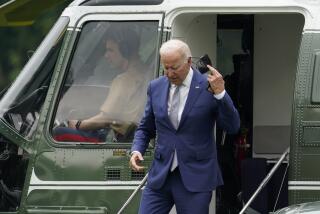Clinton Acts to Head Off Strike Against Amtrak
EDGARTOWN, Mass. â President Clinton, moving to head off a rail strike that could hamper 500,000 Amtrak commuters throughout the Northeast, created a special three-member emergency board Thursday to investigate the labor dispute and draft a proposal for a settlement.
The action was designed to buy more time for Amtrak and members of the Brotherhood of Maintenance-of-Way Employees union to work out their differences. Clinton acted under the authority of the Railway Labor Act, which empowers a president to prevent the disruption of interstate commerce.
The union, which represents workers who maintain tracks and overpasses, had rejected an offer for binding arbitration from the National Mediation Board and would have been free to call a strike Sept. 5--crippling rail service in cities such as New York, Chicago, Boston and Philadelphia.
A strike of those proportions âwould have an adverse effect on the traveling public and would severely hamper freight rail shipments,â the White House said in a statement from Marthaâs Vineyard, Mass., where Clinton is vacationing. âOver 500,000 . . . passengers would be affected.â
Clintonâs order Thursday creates a 60-day cooling-off period. That gives the emergency panel 30 days to make recommendations for a settlement and provides an additional four weeks for the union and Amtrak--the quasi-public company that operates under government subsidy--to decide whether to accept it.
The presidentâs action also paves the way for Congress to intervene in the dispute, as it has in previous cases, if a strike seems imminent after the 60 days. Congressional action could come as early as Oct. 25. Had Clinton not acted this week, the strike could have hit when Congress was still in recess.
Leaders of the maintenance workers union reacted angrily to Clintonâs decision. Jed Dodd, general chairman and spokesman for the organization, called the action âunconscionable,â particularly after the White House allowed the Teamsters to strike United Parcel Service of America without intervening.
âWeâve been working without a contract for more than 2 1/2 years,â Dodd said in a telephone interview from his office in Philadelphia, âand now, when we finally get an opportunity to use a little pressure, the government interferes.â
The presidentâs action, which comes on the heels of the settlement of the 15-day strike by the Teamsters union against UPS, marks the 12th time Clinton has invoked the Railway Labor Act provision since he took office in 1993.
Clinton named a similar emergency panel in February to help force a settlement in a strike threatened by the Air Line Pilots Assn. against American Airlines. The move ended the walkout only a few moments after it began.
The maintenance workersâ dispute has been low-key by most standards, overshadowed by the Teamsters strike. UPS workers returned to their jobs Wednesday.
Negotiators said the railways dispute involves a wide array of issues, from wages and benefits to work rules and job security. The 2,500-member union settled similar disputes with other passenger carriers last year, but Amtrak has refused to do so, saying the package would prove too costly.
White House officials said that had the strike against Amtrak not been averted, it would have impeded commuter and intercity rail service throughout the crowded Northeast corridor and probably curtailed freight service in the area by Conrail, which uses many of the same routes.
The panel is scheduled to begin hearings on the maintenance workersâ case Monday and hopes to complete its investigation of the dispute--and make recommendations for a possible settlement--by mid-September. The two sides then would have a month to negotiate more changes or reject the compact.
The emergency panel Clinton named Thursday is made up of independent, certified arbitrators. Arnold M. Zack of Boston was named chairman of the committee. The other members are Richard T. Bloch of Washington and Roberta Golick of Sudbury, Mass.
More to Read
Sign up for Essential California
The most important California stories and recommendations in your inbox every morning.
You may occasionally receive promotional content from the Los Angeles Times.










